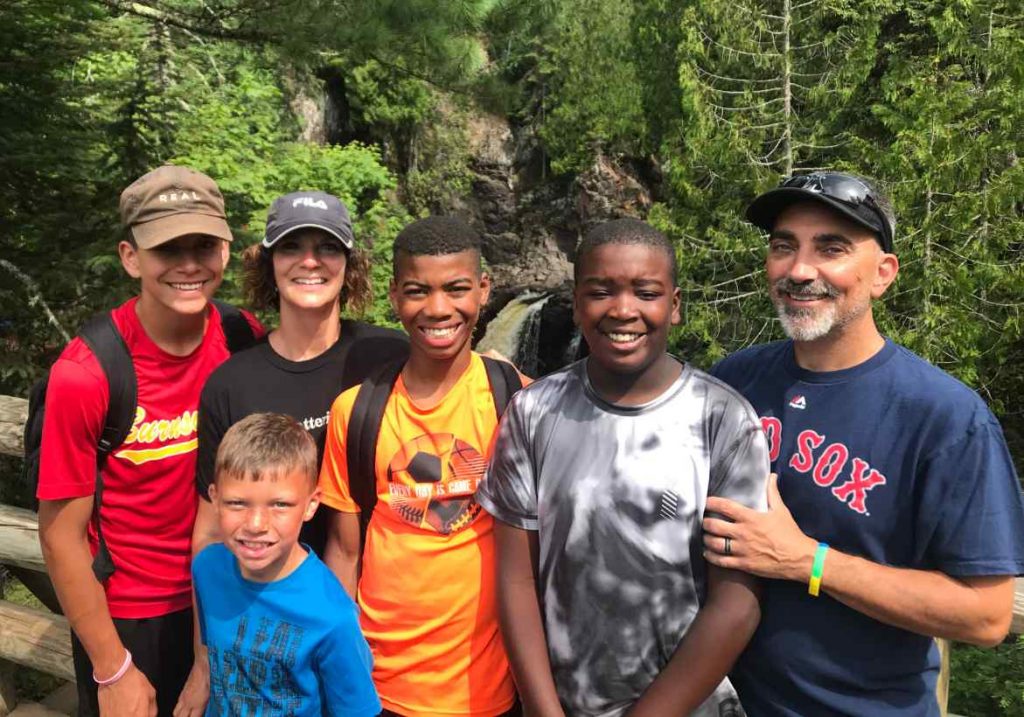We chatted with Denise Lindsey (wife of Dr. Rob) about her approach to parenting. If we had to sum up Denise’s life in two words, it would be “blessedly busy!” Denise has four boys: Elijah (16), Noah (14), Micah (12), and Jonah (7). If you’ve met these boys, you understand why we want her top parenting tips: all four are well mannered, hardworking young men. We hope you find some inspiration or ideas for your own family.
Commit to Purposeful Family Time
Intentionality and quality time are important values for the Lindseys. The family is very thoughtful about how they spend their time and how they create open and trusting relationships with each other to strengthen their familial bond.
“We do as much as possible as a family. We want to make sure we are talking and sharing our lives together, so we go for bike rides, play games, and go camping as a family. Generally, we choose things that we can be involved in together,” says Denise.
A few examples include participating together in sports and church. “All of the boys play baseball, so you can find the whole crew at the field! At church, we find ways to serve as a family,” Denise shares. “We joined the cleaning ministry when Jonah was still in a stroller, so he could sit and watch, or older kids would watch him in the nursery while the rest of us would clean. We’ve also packed food, served in kids ministry, and ushered. The boys have grown up knowing this is just something we do, and we do it as a family.”
“We’re very purposeful about eating meals together whenever possible, and we don’t really watch any TV regularly—other than the Olympics or football—then we’re glued to the TV! We also don’t have gaming systems,” explains Denise.
Some parents might wonder: how do you limit four boys to not watch TV or play video games? “We started parenting right away with several convictions,” said Denise, “which has really made it much easier to not have to backpedal with poor habits.” Neither Denise nor Rob watched much TV prior to having kids.
“TV just isn’t something they grew up with,” she explains. “When it comes to video games, we sat down with the kids and talked about how it is OK to play nonviolent games with friends at their houses, but we decided for our own family we won’t have them available because we don’t want it to be distracting from what God had planned with us. It worked well to gently ‘lay down the law’ while explaining a little bit the reason why.”
“Don’t get me wrong,” adds Denise, “We aren’t perfect. We do occasionally have those moments where we are tired and just need to unwind with a movie, but it’s an exception and not the rule.”
Establish a Routine
When we ask Denise what it’s like raising four boys, she admits it stays BUSY and there are times it’s hard to keep up with them. “When energy levels get to point where the boys need to burn off testosterone, I’ll tell them to hit the cul-de-sac or run laps around house. The neighbors can tell you it’s not an uncommon sight to see them circling the house! They have an incredible amount of energy, and sometimes they need to burn it, even if not in a productive way.”
Don’t be fooled – most of the day at the Lindsey household is anything but unproductive. When it comes to managing a household of growing boys, Denise is quick to recommend having routines in place.
“From the time the boys were little, we started establishing routines. The routines keep them occupied and purposeful. As soon as they could sit on their own, we worked on being still and setting aside quiet time with God. Literally from 9 months on, they’ve always known that’s how we start our day.”
In addition to starting the day with Jesus, the family has a nutrient-dense smoothie filled with produce from their CSA box and home harvested kefir. “After breakfast, each boy fills their water bottle, which they need to finish before they can have any mid-morning snacks (which usually consist of more produce from the CSA box), and then they get a second water bottle that they sip on and finish up with lunch,” says Denise. Hydration is a pivotal part of health, with studies showing the negative impact that dehydration has on mood and the potential negative impacts it has on cognition.
During the school year, their routine focuses on home schooling and prioritizes spending time in nature daily. “Even if it requires snow suits and blankets, we still get outside for walks every day!” exclaims Denise. “It’s so important to be exposed to fresh air, sunlight, and the stimulation of being outside.”
The boys also get in physical and mental stimulation each day with activities like baseball and piano. “All of our kids play piano and started young. They practice every day. We’ve found this is really helpful not only because it is good for the brain, but it also gives the boys something to work toward,” says Denise.
Of course, another part of the boys’ daily routine are their chores. “They have grown up knowing that part of their job as a member of the family is help manage the house and yard. It’s just another way to give them something to work toward, keeping them purposeful and out of trouble.”
Chores: Lessons in Teamwork
Even though chores have been a natural part of the Lindsey household since the boys were young, just like with any other family, there are days when the boys demonstrate some attitude about doing their chores. But Denise approaches this attitude from a very specific angle.
“We’ve always emphasized they have chores because we are family and team, so there has been minimal resistance,” clarifies Denise, “But, when there is a little attitude or push back, we bring back that reminder that we are a team—we all use this house and all need to be able to contribute. When kids show this resistance, it’s more of a character issue that needs to be dealt with, so we need to get to the root of resistance in their character, which we address by having conversation about their values. For example, by asking whether they agree that being a part of the family is an amazing gift that they can contribute to.”
When it comes to the actual tasks, it has changed over the years and the Lindseys have tried different systems of reward. However, one thing has always remained the same: “We’ve never had allowances tied to chores, because this is just part of being the family, and these are life skills that they need to learn” explains Denise. “Someone once told me to set the kids up by their early teens years to know how to run the household in the event that mom or dad isn’t in a position of being able to, so we train the boys in managing each area of the house.”
For example, each boy has (or will eventually have) the experience managing the kitchen, bathroom, floors, etc. “When they are the kitchen manager, they load and unload the dishwasher, chop veggies, set and clear the table, clean the countertop… those sorts of tasks. Right now, one boy is on kitchen duty and will stay there until he’s managing the kitchen with excellence, and then we can look at giving him a new aspect of the household to manage,” explains Denise. “Jonah, our youngest, is in the phase of learning specifics of each of the areas and helps out his brothers. Once he’s a little older, he can start to focus on one area, just like his brothers. The goal with this approach is to stay with something for a long time, so they get proficient in it before moving on to the next area.”
Since the routine chores aren’t given an allowance, you might wonder how the boys earn money to afford the things they want to do. But the Lindseys have set aside additional jobs they can be paid for like washing the car and other more “obscure” jobs that don’t happen routinely. They are also encouraged to help with paid jobs around the neighborhood.
Keeping Kids Healthy: It Takes a Village
When it comes to keeping her boys and her family healthy, Denise shares that Valeo has played an important role. “[Dr.] Rob makes sure everyone in the family is getting adjustments, and when there is something quirky going on, he is able to test us and support our health with the recommended protocols and supplements” shares Denise. “These natural approaches have allowed us to avoid the medical model for vast majority of the children’s lives.”
Denise and the kids have used many of Valeo’s services throughout the years. “We’ve used adjustments, essential oils, prayer, supplements, and general support. What really goes above and beyond with Valeo is how the people there are following up with us to see how we are doing. It isn’t just a wellness center, it’s more like a complete wellness community,” she says. “The love and support we’ve found in Valeo has been invaluable to my family.”
Denise stressed that finding a medical doctor who supports their natural approach to health and values their medical decisions as parents is absolutely necessary. “When there is a need for a medical doctor to look at the situation, we go to a doctor where we feel like natural health is still a priority. Nobody spends more time with my kids than I do, so it was also a top priority to find a doctor who holds in high esteem the parents’ place in their children’s health.”
Another thing that sets Valeo apart from other healthcare centers is that Valeo recognizes the impact that all aspects of life can have on health. “It’s interesting that in light of all the things in the world right now—with people’s reactions to the pandemic—people have started to see there are many pieces to health, and immune system is only one aspect,” says Denise, adding, “and Valeo has known this all along.”





